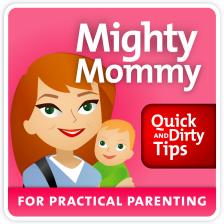How to Handle Your 3-Year-Old
Three-year-olds are curious, creative, and independent. But they can also be a handful. Mighty Mommy has 5 tips to help you embrace this challenging stage of toddlerhood.
Cheryl Butler
Listen
How to Handle Your 3-Year-Old
 I recently attended a holiday gathering with my family and had the joy of interacting with dozens of children who were much younger than my brood.
I recently attended a holiday gathering with my family and had the joy of interacting with dozens of children who were much younger than my brood.
While raising my 8 kids I can remember vividly sweating it out during many a function when one of my then toddler-aged tots would have a meltdown over not getting the cupcake frosting of his choice or being told that she couldn’t water the silk flower arrangement with her sippy cup.
In the heat of the moment, we parents work fast and furiously to defuse these “time bomb” moments. Sometimes we succeed, but often our best efforts fall short and the toddler’s cranky behavior can overpower even the most patient parent.
As my family of tweens and teens partied politely and independently, other guests were juggling babies, toddlers, and preschoolers in various states of dismay and disarray. I admit I felt a bit smug being able to hold a conversation and a cup of hot cocoa effortlessly while my neighbor with 3-year-old twins hadn’t even had breakfast yet. Exasperated when one of them started pulling ornaments off our host’s Christmas tree she yelped, “I thought the terrible twos were bad. They were nothing compared to this!”
Yep, it turns out, the threes are far worse!.
Mighty Mommy has been there, done that 8 times over and I can honestly say that the age of 3 is the most daunting and exhausting of all – far worse than the terrible two stage we all fear so much. Three-year olds are inherently curious and ready to explore and conquer the world on their terms. As overwhelming as this can be, it’s also a wonderful time as they blossom into amazingly independent little beings.
Mighty Mommy has 5 tips to help you embrace this challenging stage of toddlerhood:
Tip #1: Understand What Your Three-Year Old’s Job Is

They are constantly developing new skills, such as a better understanding of using language and engaging in conversations. They start to recognize letters in books and their imaginative play begins to blossom. Showcasing their independence is the name of their game, so stubbornness and tantrums are just a normal part of the package. Knowing that your 3-year-old is going to be curious and adventurous can be part of the solution when trying to combat poor behavior.
See also: 6 Tips for Handling a Defiant Toddler
For instance, if you have a playdate scheduled at a friend’s house, don’t expect that your 3-year-old will sit quietly and color or play blocks while you and his friend’s mom peacefully chat over coffee. That’s a pipe dream.
Instead, anticipate that he’s going to want to roam and investigate his new territory a bit before settling down to play. Rather than starting the playdate by forbidding him to move from the designated play area, take him around to check out a couple of spaces where it’s OK for kids to play in. This gives the young explorer a little control over his new environment because you’re not limiting him to a table with a box of crayons.
Tip #2: Choose Your Battles
Let’s say you’re out in public and your son is actively picking his nose. What’s your first reaction? Probably to hiss, “Don’t pick your nose. That’s a yucky thing to do!” Or let’s say your daughter chooses to wear wool tights with a pair of shorts to her grandmother’s birthday party rather than the cute skirt you picked out for her. What do you do?
Obviously you want your child to be as well-mannered, appropriate, and socially conscientious as possible, but not every moment is a teachable moment. If it’s something minor and safety isn’t a concern, let it go. Learn to pick and choose your battles. If you can ignore some of the minor stuff, you’ll eliminate a lot of your own stress. Obviously you can’t ignore bad behaviors and habits that are inappropriate, but try letting go of the small annoyances.
This method has an extra added bonus: When you stop bringing negative attention to these small matters, eventually they will work themselves out. Let’s face it, the more you fight your daughter on wearing her cute pajamas to school, the more she’s going to want to do it.
Tip #3: Distract and Re-Engage

When your spirited 3-year-old decides he’d rather grab fistfuls of Grandma’s gravel driveway to throw in the air than throw the ball around, take advantage of this opportunity. Instead of flying off the handle and yelling at him, use a controlled voice to let him know that the rocks need to stay in the driveway so the cars will have a place to park.
See also: 5 Ways to Connect With Your Preschooler
Because you’re talking to him in a calm voice, he’ll be more apt to listen to you when you suggest that he and Grandma go check out her garden to see if any frogs are hiding in the flowers. By distracting and re-engaging him you are avoiding a power-struggle over his desire to play with those awesome rocks that are just calling his name.
Tip #4: Offer Choices With Boundaries
Three-year olds are busy little bees. They can bounce from one activity to another depending on what kind of a mood they’re in. But since this is the age when many kids start preschool, they have to cope with a lot more demands and limitations that are being put on their behavior. They have to learn to sit quietly during circle time, share toys, turn-taking during group activities, among other skills. All this in addition to the new rules likely being set at home, such as helping to clean up their toys before bedtime.
It’s tough being told what to do all the time. You wouldn’t like it one bit! That’s why it’s a good idea to start finding ways to offer your 3-year-old choices that lie within the boundaries you want to set, but give the child a sense of control.
See also: 7 Simple Ways to Get Your Child to Listen
For example, if you have a child who dawdles in the morning, causing you to be late, enlist his help the night before in picking out the shirt he will wear the next morning. Give him a few options and let him choose. In the morning, remind him of how proud you are that he’s helping. Add a little gravy to the praise by letting him have a few minutes of TV time while you get yourself dressed to reinforce and praise the behavior.
And speaking of praise…
Tip #5: Praise the Positive
One common factor that most kids share is that they love getting attention from their parents and caregivers. They truly do want to please. But if they can’t get our attention from doing positive things, then they’ll happily do things that cause us to reprimand them—after all, attention is attention, no matter what form it takes.
In order to minimize negative attention-seeking behaviors, focus on what your child is doing right and heap praise then, in the moment. By making this a conscious habit when your child is 3, you’re laying a great foundation of self-esteem and encouraging her to continue making good choices as she grows.
“Maggie, that was really sweet of you to help Abby pick up her crayons when they spilled all over the floor. And then to share your red crayon with her because hers was broken. Nice job!”
See also: 5 Ways to Speak Positively to Children and 10 Fresh Parenting Resolutions for the New Year

Be sure to sign up for the upcoming Mighty Mommy newsletter – chock full of practical advice to make your life as a parent easier and more enjoyable.

